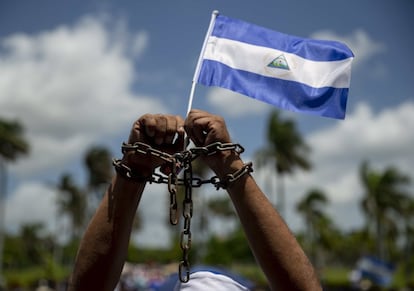The Nicaraguan opposition embarks on a new search for unity against the Ortega regime
The Monteverde Group, formed in exile, seeks to overcome internal ideological differences and achieve ‘a peaceful solution to the dictatorship’


Exiled over and over again, the Nicaraguan opposition is embarking on a new search for unity against the regime of Daniel Ortega and Rosario Murillo – a goal that, after the protests of 2018, had become elusive.
The main opposition leaders met this past week in Houston, Texas. In a statement, they announced that they had formed the Monteverde Group. This isn’t a political platform, but rather, a “space” that “seeks a peaceful way out of the dictatorship and the construction of a democratic society.” Above all, this new project will attempt to bring together the various groups who are opposed to the Sandinista apparatus. The Sandinista National Liberation Front has ruled Nicaragua uninterruptedly since 2007.
The meeting in the United States brought together the exiled opponents for the first since 2018. This past February, the main leaders of the Nicaraguan opposition – who had been imprisoned – were released and exiled by the regime. Put on a plane to the US, the political exiles – including former presidential candidates – were stripped of their nationality by the Ortega regime.
“This unity process is an inclusive space, in which people from various sectors can participate, including youth, farmers, leaders of political organizations and business leaders. The diversity of perspectives is valued and encouraged in this space… this is the only way to achieve collective enrichment and a plural and diverse [unified bloc] that is capable of leading the country’s democratic transition,” reads the statement that was signed by the opposition leaders.
Despite the fact that the Monteverde Group was formally announced on June 28, it was a space that has existed since late-October of 2021, born in a mountainous area of Costa Rica (from which the group takes its name). Democratic opponents – including those exiled in Costa Rica since 2018, as well as those who hadn’t been hunted down by the regime’s police by that point – founded this group to demand the release of political prisoners. However, the coalition was also brought together by the urgent need to resolve the internal differences of the opponents of Ortega. They have been marked by an ideological argument between the left and the right.
Since the popular uprising against Ortega and Murillo began, the opposition to the regime has been quite diverse: it includes students, peasants, businesspeople, traditional politicians, civil society leaders and former Sandinista guerrillas, among others. They all oppose the regime and have been hit equally by the presidential couple’s crackdown. However, they haven’t managed to form a single opposition bloc, due to mutual mistrust. The ideological factor has permeated in such a way that it has dynamited the desire that has been nurtured since 1990, when a coalition of political parties – called the National Opposition Union (UNO) – brought Violeta Barrios de Chamorro to the presidency. Back then, after 11 years in power, the Sandinista revolution was defeated at the polls.
After the 2021 elections – which saw Ortega and Murillo remain in power – the Monteverde Group sent antagonistic political actors into exile: from Kitty Monterrey – president of the Citizens for Freedom Party (CxL) – to members of the National Unity Blue and White (UNAB, named after the colors of the Nicaraguan flag) and the Democratic Union of Renewal (UNAMOS). “The first meetings in Monteverde (Costa Rica) constituted the initial approaches and the creation of a space for dialogue between people individually, but also linked to different pro-democracy groups in Nicaragua. These meetings made it possible to reduce prejudices and preconceived ideas among people with different political perspectives, [while also] opening bridges of communication. Everything is based on respect,” a source linked to the Monteverde Groups explains to EL PAÍS. Fearing reprisals against their family in Nicaragua, they have requested anonymity.
“Ortega is everyone’s adversary”
The main criticism that the Monteverde Group has received comes from ultra-right sectors – most of them based in Miami – who point out that the group is “a nest of leftists.” However, the members of the group maintain that the space “has more people from the center and right than from the left.”
“There’s a good balance in the group. The most important thing to note is that the fundamental problem in Nicaragua is between dictatorship and democracy. Ortega is everyone’s adversary,” says a source linked to the opposition,
According to the statement issued by the Monteverde Group this past Wednesday, those who participate in the forum do so individually, based on principles such as “respect for democratic foundations and human rights, a commitment to dialogue among participants and the construction of consensus, with a commitment to civic action and inclusion.”
“The biggest challenge has been to put aside the positions that divide us and reconcile everyone’s interests,” insists one of the Monteverde members. “Based on that principle, in this process, the ideological flags stay at home. The dialogues and consensus that we seek are based on democracy, justice and freedom, regardless of political ideology,” the group states.
There are many other members who prefer to keep their participation anonymous for reasons of “security.” Yet, there are others who have openly declared their participation: Eliseo Núñez, Héctor Mairena, Jesús Tefel, Alexa Zamora, Daisy George, Luciano García, Juan Diego Barberena, Francisca Ramírez, Ana Quirós and María Laura Alvarado are just some of them. Almost all of these opposition leaders were stripped of their nationality by the regime. “Monteverde is defined as a process of agreement and action, of national and international collaboration to contribute to the construction of democracy in Nicaragua,” they affirm.
While criticisms and suspicions about the Monteverde Group persist, independent analysts consulted by EL PAÍS agree that the challenge for the opposition is enormous. For now, the opposition leaders must articulate their position from exile, while they deal with the fact that, by not having a nationality, they have no means to aspire to elected office in Nicaragua. On top of this is the added problem that they don’t have a clearly-articulated national plan to propose to the Nicaraguan people. This new attempt at unity – which aims to gather more participants – aspires to change the disappointing trend. So far, all attempts to put forward a single emblem have ended in failure.
Sign up for our weekly newsletter to get more English-language news coverage from EL PAÍS USA Edition
Tu suscripción se está usando en otro dispositivo
¿Quieres añadir otro usuario a tu suscripción?
Si continúas leyendo en este dispositivo, no se podrá leer en el otro.
FlechaTu suscripción se está usando en otro dispositivo y solo puedes acceder a EL PAÍS desde un dispositivo a la vez.
Si quieres compartir tu cuenta, cambia tu suscripción a la modalidad Premium, así podrás añadir otro usuario. Cada uno accederá con su propia cuenta de email, lo que os permitirá personalizar vuestra experiencia en EL PAÍS.
¿Tienes una suscripción de empresa? Accede aquí para contratar más cuentas.
En el caso de no saber quién está usando tu cuenta, te recomendamos cambiar tu contraseña aquí.
Si decides continuar compartiendo tu cuenta, este mensaje se mostrará en tu dispositivo y en el de la otra persona que está usando tu cuenta de forma indefinida, afectando a tu experiencia de lectura. Puedes consultar aquí los términos y condiciones de la suscripción digital.








































